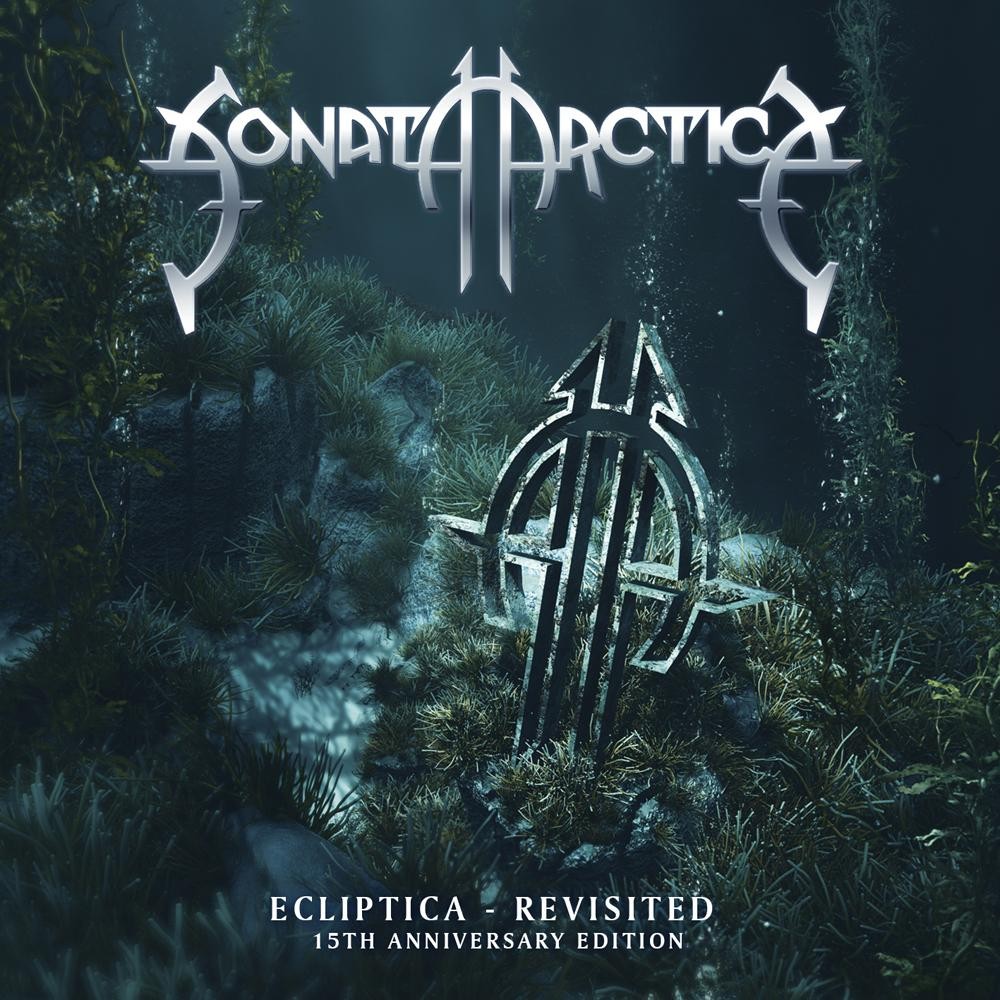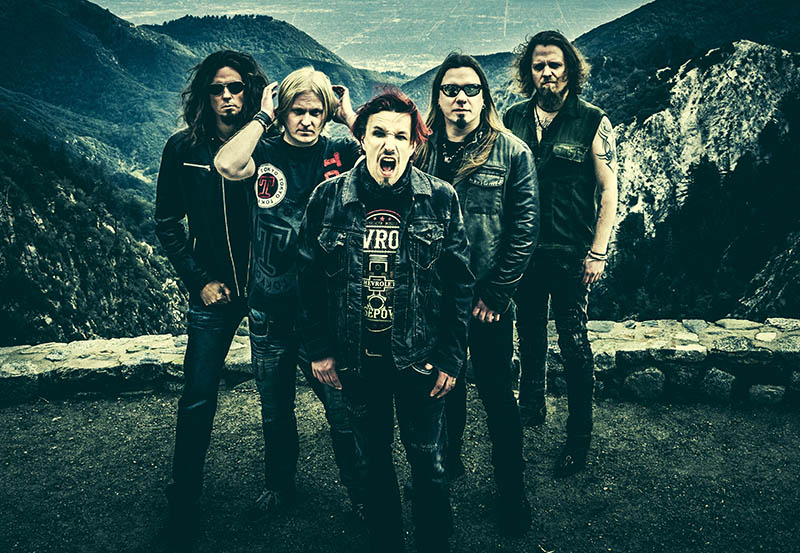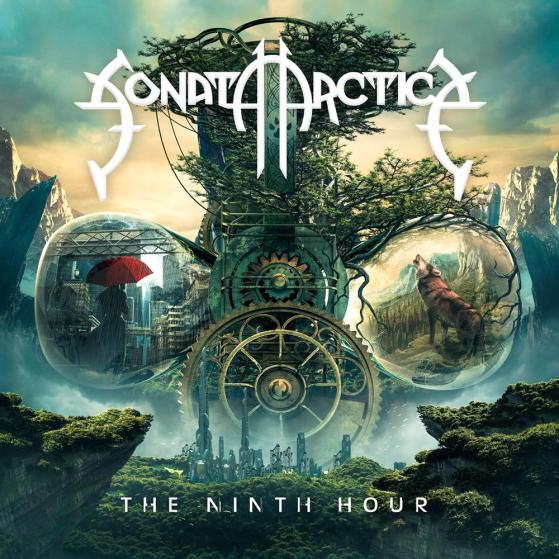MB: Do you feel that there is a certain expectation, perhaps based on your music or sound, that makes people expect you to be a certain way?
Toni: Sometimes. Some people have told me that I am different from what they thought I’d be. I am not ask dark in person (not at all, it’s pretty much the opposite!). My lyrics are pretty gloomy, so maybe that’s the ying to my yang, my way of getting my dark side out. Then again, it’s also in contrast with the music, since the songs are often very cheerful, with darker lyrics
MB: I remember speaking with Jonas Renkse of Katatonia, who told me that it’s almost like some people resent him if he’s not being depressive, because that’s what they expect form his lyrics.
Toni: I can sort of understand that if it’s the darkest of the darkest black metal bands, and then you meet this cheerful, happy, smiling guy, with flowers on his hair… the contrast might be destroying even some of his credibility. In certain genres it’s also about keeping appearances and only smile behind closed doors. I’m very happy that I didn’t choose to go in that direction! I can just be myself.
MB: At the beginning of Sonata Arctica, was there a moment when you actually thought about different stage personas, or different ways to present yourself?
Toni: Not really… well, with the name, yes. My real name is Toni, with an “i”, but I think in America that’s a girl’s name [laughs] the same with our drummer Tomi, so we just added a “y” at the end, but nothing bigger than that.
When they told me that we actually got a recording contract I remember just wondering whether I should change my name. In the end I didn’t care. I just wanted to make music and be myself. I’ve kept that up, in both good and bad.
MB: I was recently talking with a musician friend about her thoughts when she was a kid about getting a record deal. When you got that first recording contract, did you think that it was this HUGE thing, like you were on your way to be rich, or were you more down to earth about it?
Toni: [laughs] I never thought that; I just wanted to go one album at a time, and didn’t think beyond that. We were so young, we didn’t know anything about the business or about making music. We were picked up green from the tree, and told to go roll around the world and make albums.
We learned by doing, we didn’t have any plans. We made a lot of mistakes that were sometimes cute, and sometimes goddamn awful. But you learn by doing, and I’m very glad that I kind of allowed myself to do that, to learn from what I’ve done, instead of hiring outsiders to decide things for me, what to wear or how the music should sound, in order to get the best possible results. I value the original touch; I hate it when everybody starts sounding and looking the same.
MB: Since you mention that when you just started the band, perhaps you didn’t really know how to make music, or how to be musicians; when you look back at Succesor or Ecliptica, are you dissatisfied with what you see? I know that you re-visited Ecliptica recently.
Toni: In that case the reason wasn’t that we were unhappy with it. It was actually a request from our label in Japan, who have gone through thick and thin with us from the beginning. They kindly asked us whether maybe it would be possible to re-record Ecliptica, trying to make it sound as close to the original as possible, but with the current line-up and the way we are today.
At first it felt really wrong to do it, but then we decided to do it just for the Japanese label, thinking we wouldn’t even release it outside of Japan but… [laughs] well, Nuclear Blast got the news about it and wanted to release it too. It’s out there.

It did give me a chance to give myself new versions of songs that had parts that I really hated in the original. Before we started to record the re-visited version we had to get really into the original again, to get the hang of it. WE have been playing most of the songs during all of tours, but they have changed so we needed to get a hang of how we did it originally on those albums.
I think that I kind of grew up during that process, as it kind of gave me a chance to discover what people appreciated about us back in the day. The album was like a curse for me for a long time; I hated all those things that new I consider to be somehow “cute,” original, and signs of our youth and inexperience. These days I give them a high premium. The reasons why I hated the original Ecliptica for so long are actually the reason why I now call it the better version of that album. I think it’s better than the remake. It has more feeling, things that you cannot reproduce at this age anymore; the innocence, the youth, the inexperience and the feeling of danger. Nowadays we are just “too good” [laughs] to record Ecliptica the way it was back then.
MB: For me it was the same thing. When I listened to the remake it was nice to listen to new takes on the same songs, but I still prefer the first one, even though you now have better production, etc. It was just much more enjoyable. Of course, it’s interesting to now know what was the reason why you actually made this new version.
The title of your new album, “The 9th Hour,” is apparently a biblical reference to the Gospel of Matthew, but also a reference to the fact that it’s your 9th album. I know that you’re not a particularly religious person, so what was the meaning that you were actually going for with that title?
Toni: It’s easier if we look at the cover.
We have this utopian landscape, where nature and human technology, everything is in harmony. Then, in the middle, you look at this hour-glass contraption with a little button with arrows. This buttong represents everything that we are doing today to destroy our planet. Eventually, the more we keep hitting this button, the hour glass will tilt in one direction or another, and it will destroy one of these alternatives. On the left side we have dystopia, where nature has been destroyed, where we are just suffering and living a grey, miserable life. On the right side, just nature. The human element is gone after we annihilated ourselves, and the nature has had the chance to heal itself, and everything is beautiful.
As for the name; I had the concept of the cover ready and, since it was hour 9th album, I thought about The 9th hour. It was literally the first idea that popped into my mind, something that most of the time doesn’t give you very good results! [laughs] It had the right feel to it. I’m not the most religious person, but I knew that it also had some religious meaning, so I had to study it and see all the meanings… because it could also mean something that doesn’t fit at all with it, or which could backfire drastically [laughs]
MB: And that’s when Toni realized it’s a reference to burn people…
Toni: Or something else really awful; I don’t even wanna think what it could be! The one line that I took from that reference though, and which I think fits perfectly, is that on the 9th hour God only wants us to sacrifice and repent. I think that fits my idea, because nowadays we are living in a time where we have to make sacrifices to allow the environment to survive. We have to change our ways, give up our greed, and let nature heal. In many cases we should have repented already, and we will be sorry for some of the things that we, or especially the previous generation, have done. They have polluted so much of this planet to make things better for themselves, destroying the planet for their children at the same time-
MB: In the concept there seems to be this thing, which I feel I’ve seen before in Sonata Arctica, and which is the skepticism about technology. I remember listening to songs like Blank File and Weballergy, and they seemed to be songs that, at least the way I interpreted them, sort of dealt with the risk that came associated with a very techno-centric society. Do you consider yourself, as presented through your lyrics, as somebody who is fairly skeptical about technology?
Toni: Quite the contrary, actually. I think it will be what saves us. Let’s assume that we will roam this planet for a billion years more, until the sun chances. We can either evolve to withstand that, and that’s a long-shot, or we can develop technologies to migrate to other planets.
I think that technology is beautiful, but I resent the way in which we develop it sometimes. It’s through greed. We need to make it sustainable, clean, and good in every possible way. Everybody should be in line with this, not just regular people, but companies and nations. Nobody should be polluting. It’s getting better, but we’re a long way from getting this to be good. Think about how much the world has changed since I was a kid; we didn’t recycle. The only form of recycling that I can think of would have been things like flea markets. The best you can do is to teach these things to your kids and let them grow up with these behaviors as their default.
MB: The problem is that by the time a given generation or society realizes how things need to be done, it might be too late. That’s what is happening now with climate change, for example. The fear is that by the time the industry comes to terms with the reality of climate change it might be too late to offset the damage that we’ve already done.
Toni: Yeah, that’s the fear.
MB: When you released Stones Grow Her Name, you said that power metal wasn’t something you were particularly interested in anymore. And yet, Pariah’s Child, its follow-up, kind of represented a return to that sound. How do you feel the 9th hour appears in that “sound history” of the band. Do you feel that you’re embracing the proggy, 80’s rock kind-of-sound Stones Grow Her Name, or power metal again?
Toni: I think that Pariah’s Child was more of a power metal album than The 9th Hour.
Well, to start with, it feels weird to call ourselves “power metal;” I think that “melodic metal” is more appropriate. If you listen to the “really” power metal bands, with the extremely speedy stuff, well, we’re quite far from that.
I’ve told labels many times that this feels wrong; and we’re facing the fact that people whine that these are really shitty power metal albums. Well, yeah, there might be a reason for that [laughs]
MB: Having said that, when Pariah’s Child was coming out I do believe you referred to it as “power metal”
Toni: Yeah, well, that was because touring Stones Grow Her Name had started to be really, really boring. We lost a lot of the energy and fun that we had on stage, and that we could see and get from the audience. The demographics of the audience started changing; we lost basically all the headbangers at the time. WE started to get a different crowd; although it’s always fine to get all kinds of people, when you start getting bored on stage by playing your own music because it’s slow and maybe even too easy… there are nice songs there, but they didn’t do much good for our live performance. They kind of slowed us down too much. So, because of this, already during the tour we realized that we needed to go back and do something, take a few steps back, and do something more “power metal-ish.”
The 9th Hour is not really how I imagined it would be. I thought it would speedier, but that’s not how it ended up being. I think that it draws a line between the two albums. It’s not that different. Maybe the best thing about The 9th Hour is that never before had we released an album that was so well in line. All the songs are in a similar style, and so the whole album feels to me more “intact.” A couple of songs jump out at you, but that’s less than what we usually have.

MB: The 9th Hour, like most of your other albums, uses the image of a Wolf. It seems to have a special significance for you, or for the band. Why do you think you keep finding yourself going back to this image? Is it just a mascot, like Iron Maiden has Eddie, or do you feel some kind of emotional attachment to the figure of the wolf?
Toni: It’s a little bit of both. The wolf has kind of saved me from many situations when it comes to creating my music. With every album there has been a time when I hit a wall when I have no idea what write about, so I can always throw in a wolf [laughs] and use it as a metaphor for various things. Also, it works well as cover art and, especially, merchandise. We have lots of shirts with wolves on them.
It kind of became a friend and a mascot at the same time. Of course, I do feel drawn to the animal itself. It has this mystery, and it’s intriguing and scary, and yet comforting in some weird way at the same time. It has grown to be something that people now associate with Sonata Arctica. Now, when they see a wolf, some people instinctively think of the band, so we can’t really give it up.
I think that the only album since Silence, with no wolves in it, has been Stones Grow Her Name, and that was an accident.
MB: Really? I thought that it was deliberate, like there was a symbolism to not using it.
Toni: [laughs] No, that was an accident. Somebody pointed it out to me after the album was released, and I was like “wow… that will never happen again.” [laughs]
MB: Well, Hammerfall released an album without Hector, their mascot, a few years ago… and fans were REALLY pissed off. Joacim, the singer, was a bit surprised back then that people had this big attachment towards something that has no bearing on the music. Still, it does provide some nice continuity for the band, something constant in the albums, and it’s the same for Sonata Arctica with the wolf. Plus, like basically every other angsty teenage metal fan, there was a time when I also really liked wolves [laughs]
Toni: [laughs]
MB: And to conclude, and I know this probably gets asked a lot. Do you think that Northern Kings are simply over, or do you think that there are chances that something new will be recorded?
Toni: We’ve been talking about releasing something and getting something done. So far all the albums have been cover albums, and when we’ve talked about it the idea has been that we should come up with some original material already. If we were to do something, find a concept to follow, and maybe even find a queen to create a nice contrast there.
At the moment we have this Christmas show; it’s like the equivalent of what Trans-Siberian Orchestra does in the US. Raskasta Joulua, Ragnarok Yuletide; we tour every Christmas, and it’s the same bunch of people every year. It takes a lot of time for the people who run the show; I’m the singer, so I have the easy part. It’s year-long project to get it running for the following year, and they’re also touring musicians or professional studio musicians, so it’s very difficult already, coupled with the fact that a lot of the singers have their own bands. It’s a difficult thing to manage to get working on something else but, well, never say never. Anything can happen.
MB: Speaking about those covers you’ve done… are there any pop songs, things that are completely different from the music of Charon, Nightwish or Sonata Arctica, that you would like to sing?
Toni: A year ago I did this a show with a symphony orchestra, singing some songs in a more operatic style, and singing tango, and all kinds of weird stuff. I loved it! I got to play with my voice and use it in every possible way, without straining it like I sometimes do with Sonata Arctica.
It was like a vacation for me. Actually, next year I’ll have a Sonata Arctica show with this symphony orchestra. I’ll be the only Sonata Arctica member there, but the orchestra will be playing some of our songs, and it’ll a fantastic show, so I hope we can continue doing it afterwards. SO that later we can go on a world tour! [laughs]
MB: Toni, it has been a pleasure, so thank you very much.
Toni: You failed to ask me the things that everybody asks me, so thank you very much!

